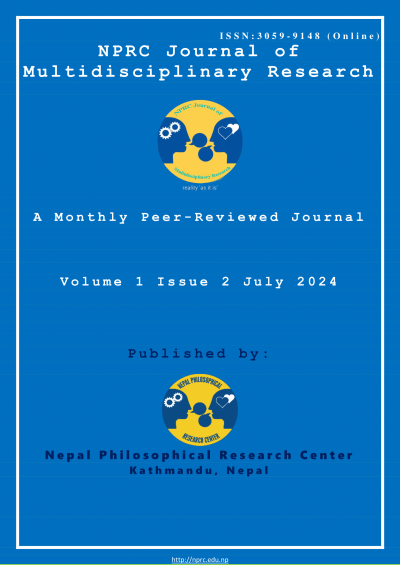Service Quality Variables and Customer Satisfaction at A Nepalese Commercial Bank
DOI:
https://doi.org/10.3126/nprcjmr.v1i2.69293Keywords:
Customer satisfaction, Nepalese commercial bank, service qualityAbstract
Customer satisfaction is a critical component of banking strategy, which reflects customer sentiment towards an organization's offerings, emphasizing emotional attachment over mere satisfaction. This research investigates customer satisfaction in commercial banks of Kathmandu Valley in Nepal. The study conducted a descriptive cross-sectional study using a quantitative research design, explicitly targeting 380 general customers of commercial banks in Kathmandu Valley through convenience sampling. Participants received a semi-structured questionnaire via email in Google Forms, encompassing inquiries on demographics, banking habits, and customer satisfaction. Data analysis was performed using SPSS version 20, and a p-value below 0.05 was considered statistically significant. The investigation found that the study population appears to be young, as 46.6% of the participants are in the 18–30 age range and predominantly male (56.6%). Most respondents (88.4%) hold accounts with private banks. Among those experiencing ATM service-related problems, 45.5% encountered them most frequently. Despite this, overall customer satisfaction remains high. Customers are notably content with the bank's reliability, including timely service and accurate record-keeping. Conversely, dissatisfaction mainly stems from communication issues, particularly regarding timely interest rates and service updates. Customer satisfaction is significantly influenced by service quality factors such as reliability, responsiveness, empathy, assurance, and communication. These findings highlight the necessity of addressing service challenges to enhance customer satisfaction and service quality within Nepal's banking sector.
Downloads
Downloads
Published
How to Cite
Issue
Section
License
Copyright (c) 2024 The Author(s)

This work is licensed under a Creative Commons Attribution-NonCommercial 4.0 International License.
This license enables reusers to distribute, remix, adapt, and build upon the material in any medium or format for noncommercial purposes only, and only so long as attribution is given to the creator.





